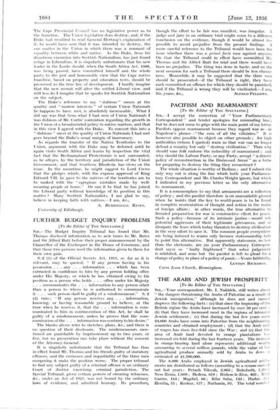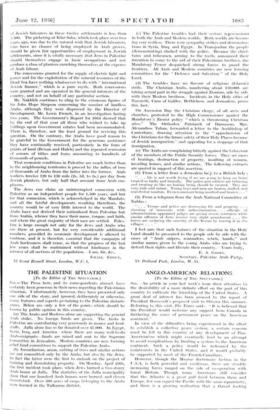SIR,—Your correspondent, Mr. I. Nakhleh, still writes about " the
dangers threatening the Arabs of Palestine as a result Of Jewish immigration," although he does not and cannot disprove the following facts : (a) that since the beginning of the British regime the Arabs have increased by over 50 per cent. ; (b) that they have increased most in the regions of intensive Jewish settlement ; (c) that during the last few years some 24,000 Arabs have come into Palestine from the neighbouring countries and obtained employment ; (d) that the Arab rate of wages has risen five-fold since the War ; and (e) that the area of Arab land devoted to orange plantations has increased six-fold during the last fourteen years. The Mere:1,e in orange-bearing land alone represents additional wealth amounting to several million pounds, while the value of the agricultural produce annually sold by Arabs to Jews is estimated at £1,500,000.
The 8,000 Arabs employed in Jewish agricultural settle- ments are distributed as follows (according to a census carntd out last year) : Petach Tikvah, 2,963 ; Rehoboth, 1,296 ; Ness Ziona, 1,989 ; Hedera, 618 ; Rishon-le-Zion, 403 ; Kfar Ganim, 164 ; Magdiel, 66 ; Kfar Saba, 133 ; Hadar, 53 ; Herzlia, 55 ; Kerkur, 157 ; Natbania, $5, The total numb r
of Jewish labourers in these twelve settlements is less than 4.300. The picketing at Kfar Saba, which took place over two years ago, was due to the natural wish that Jewish labourers, who have no chance of being employed in Arab groves, should be given fair opportunities of employment in Jewish settlements, since it is vitally necessary that Jews in Palestine should themselves engage in basic occupations and not produce a class of planters enriching themselves at the expense of Arab labour.
The concessions granted for the supply of electric light and power and for the exploitation of the mineral resources of the Dead Sea have nothing whatsoever to do with " international Jewish finance," which is a pure myth. Both concessions were granted and are operated in the general interests of the country, and not on behalf of any particular section.
Mr. Nakhleh continues to cling to the erroneous figures of Sir Jolm Hope Simpson concerning the number of landless Arabs, although they were disproved by the Director of Development, Mr. Lewis French, in an investigation lasting two years. The Government's Report for 1934 showed that by the end of that year all those who wished to take up holdings upon Government estates had been accommodated. There is, therefore, not the least ground for reviving this question. On the contrary, the Arabs have good reason to be grateful to the Government for the generous assistance they have continually received, particularly in the form of grants of land (Beisan and Huleh) and the repeated remission of arrears of tithes and loans amounting to hundreds of thousands of pounds.
That economic conditions in Palestine are much better than in the neighbouring territories is proved by the influx of tens of thousands of Arabs from the latter into the former. Arab workers receive 120 to 150 mils (2s. 5d. to 8s.) per day from Jewish planters, but only half that amount from Arab en►- ployers.
The Jews can claim an uninterrupted connexion with Palestine as an independent people for 1,500 years, and but for that connexion, which is acknowledged in the Mandate, and all the fateful developments resulting therefrom, the country would be of very little interest to the world. The Arabs have not derived their nationhood from Palestine but from Arabia, whence they have their name, tongue, and faith, and where the great majority of their race are settled. Pales- tine is large enough not only for the Jews and Arabs who are there at present, but for very considerable additional numbers, provided its economic development is allowed to continue, and it is therefore essential that the campaign of Arab lawlessness shall cease, so that the progress of the last few years shall be maintained without hindrance in the interest of all sections of the population.---I am, Sir, tic.,























































 Previous page
Previous page